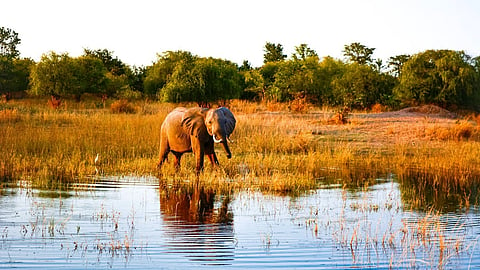Living in hope in Zimbabwe
Cathy Buckle continues to rise above the daily frustrations of living in a country given over to the greed and corruption of its politicians – does that ring a bell? – by focusing on the natural beauty of the country and its ordinary people. In her reflection below, she describes the short break needed to revive her flagging spirits, and explains what makes living in Zimbabwe still worthwhile. – Sandra Laurence
The Predator at the Waterhole
By Cathy Buckle*
Twenty-two years of writing this Letter From Zimbabwe, once a week for the first thirteen years and then once a fortnight for the next eight years, is a very long time at the wheel. After my website was hacked again recently and lines of communication were shut down I was feeling vulnerable and took a short break for a couple of weeks. It was time to revive flagging spirits, find solace and renew my love for our country. A time to put sticking plasters over the pain of the greed, corruption and never ending economic chaos that haunts our lives and decimates our futures here. This brief story today is to thank you, the people who read my letters and support my writing and books and who love our country. It is a story to remind you, perhaps, why Zimbabwe is worth it.
On a cool morning we arrived early at the waterhole. There had been a magnificent sunrise, russet and orange, the perfect colours to introduce a spring day in Zimbabwe. It was fresh and crisp and we waited quietly at the waterhole. The spring colours were gold and brown, the trees grey and mostly leafless. It's that deceptive time of year when you think you'll see things coming a mile away but it's also the time when camouflage is at its best and you are never really prepared for what might emerge out of the haze and dust.
In complete silence a small herd of elephants appeared, alert and nervous, trunks up, sniffing in all directions, looking across the waterhole. Something had them on edge: was it us or was it something else? Three big female elephants and a youngster moved quickly to the water's edge, hurriedly sucking up water and pouring it into their mouths. Four, five, six times trunks went down into the water and then suddenly the elephants all turned and ran back into the bush, kicking up dust behind them. We waited and watched, quiet, not moving; the minutes ticked past and then we saw it. A single spotted hyena trotted through the bush towards the waterhole, its strange sloping back identifying it immediately.
Even the birds lifted up from the water's edge to give way to the predator and the hyena stopped, looked and sniffed in our direction; we were out of sight but it undoubtedly knew we were there. The hyena bent and drank for a long time until at last, water dripping from its muzzle, it took one last look in our direction and turned and disappeared back into the bush. Fifteen minutes later the elephants reappeared, more joined them and we watched as a dozen big elephants and youngsters took their turn at the waterhole, ankle deep in black mud, they drank their fill.
For too long Zimbabwe has had predators drinking at the waterhole and as election 2023 draws near, we can but hope that it will be someone else's turn next year.
- For information on my books about Zimbabwe go to www.lulu.com/spotlight/CathyBuckle2018. For archives of Letters From Zimbabwe, to see pictures that accompany these articles and to subscribe/unsubscribe or to contact me please visit my website http://cathybuckle.co.zw.
Read also:

